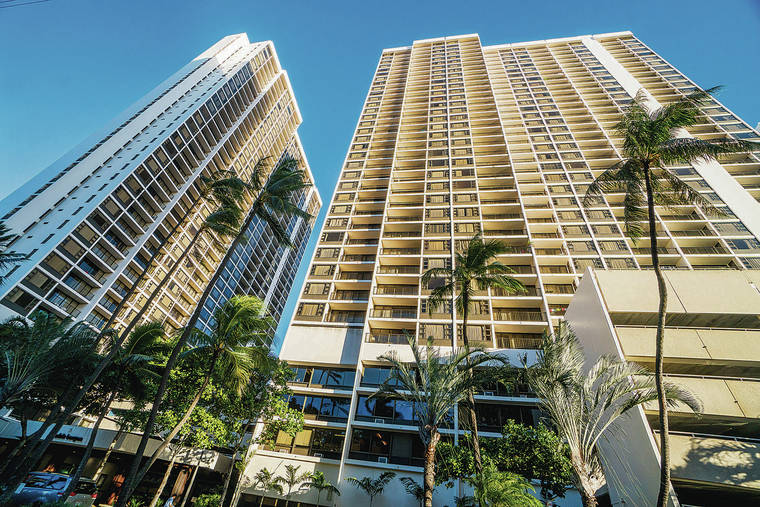Waikiki Banyan condominium owners have received a courtroom stay temporarily preventing the city from enforcing a new law designed to crack down on
illegal short-term rentals.
The Waikiki Banyan — an 876-unit, twin-tower complex at Kuhio and Ohua avenues — has been operating as a condominium hotel since it opened in 1979.
But the city said most Waikiki Banyan units are not legally permitted to be rented short term and, under the new law that took effect Aug. 1, are subject to fines
of up to $10,000 a day.
The Waikiki Banyan is on the mauka side of Kuhio Avenue, which is designated for residential-business use. The makai side of the street is zoned for hotel-resort use.
The stipulation of stay order was approved Oct. 17 by Judge James Kawashima and signed by attorneys for the Association of Apartment Owners of Waikiki Banyan, the city’s Department of Planning and Permitting and its acting director Kathy Sokugawa.
The Waikiki Banyan owners wanted the injunction to prevent the city from imposing its new ordinance on them. The new law bans advertising of unpermitted short-term rentals.
Under the terms of the stay order, the Waikiki Banyan owners will attempt to reach an agreement with the DPP on a way to move forward. The owners hope the city will agree to designate their building as legal for
hotel use.
While they are working on the agreement, the city will not enforce the new law against Waikiki Banyan owners.
Since Aug. 1, the city issued three notices to Waikiki Banyan owners that they were in violation of the new law. According to the stay order, those violations will be withdrawn and canceled.
The stay will be lifted after the Waikiki Banyan “has exhausted any and all administrative remedies, including any such appellate review,” or by “mutual agreement by the parties.”
Overall the city has issued 136 “notices of violation” related to illegal short-term rentals since Aug. 1, DPP spokesman Curtis Lum said Wednesday. After receiving a notice of violation, a property owner has seven days
to correct the violation by removing any advertisements. If it is not corrected, the city can issue a “notice of order” and begin collecting fines.
Lum said the city has only issued three notices of order for uncorrected violations and it hasn’t collected any fines.
The passage of the new law, known as Ordinance
19-18, has been cause for
celebration for supporters who were concerned that illegal short-term rentals were depleting affordable housing and changing the fabric of
local communities.
But there was almost immediate pushback, especially from owners in resort districts like Waikiki. Some there said they were blindsided when DPP ruled that properties mauka of Kuhio Avenue, which are in apartment and apartment precinct zones, including the Waikiki Banyan, must have nonconforming use certificates
to operate legally.
Even the Hawaii Lodging and Tourism Association, a staunch supporter of the new law, objected to the broad scope in areas like Waikiki and Turtle Bay, which many view as hotel-resort zones.
The Association of Apartment Owners of Waikiki Banyan filed suit against the city Aug. 9 and took immediate steps to try to prevent the city from imposing its new ordinance. The Waikiki Banyan’s lawsuit was filed in Hawaii Circuit Court.
The stay is a boon for advocates of broadening short-term rentals; however, critics say it only reduces clarity for a complicated situation.
K.C. Connors, a Koolauloa community activist, said she worries that the stipulation will set a dangerous precedent that could undermine enforcement and lead to the further spread of illegal short-term rentals.
“Laws need to be clear. Those who bought residential properties have a right to live in residential areas. Families and working people have a right to affordable housing and to know their neighbors,” Connors said.
Kathleen Pahinui, North Shore Neighborhood Board chairwoman, said she’s not in favor of any rulings that “undermine the integrity of the ordinance and could set negative precedents.”
While the North Shore hasn’t seen much enforcement activity since the new law went into effect, Pahinui said some communities have reported improvements due to voluntary closures of illegal short-term rentals.
On Oahu, there are currently 770 legal short-term rentals outside of resort zones. Owners of properties in resort zones don’t need permits to operate. Prior to the new rules, DPP estimated that there were about 5,000 short-term rental advertisements, which has since dropped to about 3,400.

